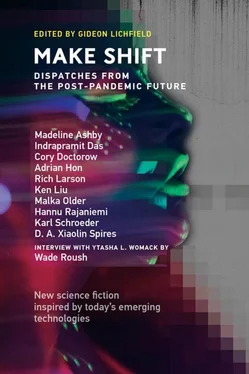“Remy! See, I knew he’d still be in the area. Call it in.” She comes up to him. “Are you okay?”
“Hi, Sendak. Can I borrow your phone?”
She laughs crazily. “Remy, we’ve been hunting high and low for you! They told us what happened at the center. We thought you were hurt… Wow, that’s quite the black eye.”
“Is it?”
She grabs him by the arm as he probes delicately at his cheek bone, and leads him to the cruiser. “Listen, we got him! His name’s Orelko. You were right, Cawley’s wife and daughters were still wearing their tracing bracelets when he snatched them. After you called we put out a BOLO and had his car followed, and he led us right to them.”
“Good,” he says as they get in the back seat. “I was just coming to see you because there’s something else.”
He waits because it’s dark under the shadow of the bridge and he wants to see her expression when he tells her this part. Remy decides he’s going to learn more about expressions. “When the kidnapper went into the testing center, he encountered someone coming out. A man in a suit. I recognized it—I recognized him. But I couldn’t place him until… later… when I was looking at the city lights. I thought about the architects I’d worked with, and the developers.
“Sendak, his name is Langdon, and he’s one of the biggest commercial property developers in town. He’s been influencing City Hall for years, everything from handing out brown paper bags full of cash in parking garages to threatening city planners. The architects I worked for hated him, but he hasn’t been able to do that kind of thing in years. At least, nothing they could prove. But now a pivotal referendum on city governance is coming up.
“So why would a property developer with a huge stake in how the city is budgeted, be coming out of the same coronavirus testing center that I set up to trap the kidnapper?”
Her eyes widen. “Oh…” He thinks he likes this expression. A second later, though, she’s frowning. “It’s purely circumstantial. It’ll never hold up in court.”
“But you caught this Orelko person. When you tell him you know Langdon hired him, he’ll want to cut a deal.”
“Hell, yeah!” says the cop who’s driving.
Sendak slumps back in her seat. “Maybe. Either way, you did good.”
“One other thing. You’ll want to delay the referendum until we can talk to Cawley. Because maybe he really did code a back door into the voting software. Maybe Langdon knows about it; where were those mysterious payments to Cawley’s accounts coming from? Maybe Cawley got cold feet. He refused to play anymore, so Langdon had him snatched to learn the passwords, or whatever it is he’s using.”
“Well,” Sendak is smiling again. “Whatever happened to ‘it’s impossible to hack the vote?’”
“If there’s a back door, it wouldn’t be.”
“So you’re still a radical liberal?”
“I don’t know, actually. I might just go for the citizens’ panels this time,” Remy says.
“What? Why?”
“Just something I saw.”
“Hey, I hate to burst your bubble,” says the driver, “but where are we going?”
“You must be tired,” says Sendak. “We’ll take you home.” But Remy shakes his head.
“I don’t want to go home yet.”
“Why not?”
Remy thinks about it. He’s found his algorithm, and it’s not about tuning down the bewildering, maddening howl of the world. It’s not about simplifying. It’s about letting all that complexity and chaos knock him into the orbit of the right people.
“It would just be nice,” he says, “to come to the station. To see Kraft, and you and your office.
“To meet the people I work with, and the rest of the boys down the hall.”

9
Mixology for Humanity’s Sake
D. A. Xiaolin Spires
OVER THE SOUND OF UBIQUITOUS BUZZING, MOM YELLED FROM BEYOND THE SCREENdoor, “Rikuta, come out and help the planting drones.”
I put the test tube into the holder, as the concoction fizzled. “But, Mom, I’m busy.” I called out for the cleanerbot and it swung in and wiped off the puddle from the tatami floor. The cleanerbot’s light blinked as it ran into the table, a series of gurgling melodies escaping from its speakers, repeatedly knocking more of the sparkling amazake drink I made onto the tatami. The smell of sweet fermented rice filled the room as the spill spread. “Gotta fix this broken thing.”
“Rikuta!” Mom’s voice roared. I turned off the cleanerbot, wiped up the rest of the spill myself, careful to move aside the fluffy zabuton I was sitting on so it wouldn’t get soaked. I threw the towel over my shoulder.
I raced over to the back door, jammed feet into slippers and hiked up my pants. I saw my dad in one of the plots, back bent and knee-deep in muddy water and beelined him. I wasn’t really keen on planting the seedlings but once Mom’s voice hit those registers, I knew she meant business. I also knew it meant a lot to her to have this family time together.
Around us drones descended onto the wet paddy, their metal pincers piercing through the water’s surface and sticking the seedlings in. I grabbed a handful of tender seedlings from the cart, wrapped them in my towel and tucked the whole thing into my pants like a makeshift quiver. I stuck my bare foot into the paddy and felt an immediate wave of cold overtake my body as the water reached my calves. Chilly mud crept between my toes. At least it was warm out. Drones buzzed around me as they completed their rows of green. It smelled of organic life. My foot released with repeated sucking sounds as I moved to an unfinished row and stuck the seedlings in. Dragonflies fluttered past me, their buzzes next to my ear louder than the drones. I completed row upon row, racing with the drones, until my back hurt.
MY BACK HURTS AS I LIFT THE TENTH KOJIBUTA, THE WAFTS OF SWEET FERMENTATIONcoming from the cedar box that holds the rice and the fertile fungus, a heavenly marriage of a marinade. The aspergillus oryzae mold spores have done their job incubating in the kojimoro and I smell the koji’s wondrous pungency. I’m distracted by my throbbing back, however, and rub my lower back through my lab coat. I bend over the koji, raking my hands through the rice mixture for a bit before I let my automata buddy Kushi handle it. When I was a kid, Mom would tell us to get the wooden rake and use our legs to get into the raking, but Mom was okay dealing with back pain and I’m not.
Kushi does the job with his giant hand and metal fingers. As he rakes, his mechanical arm advancing and retreating, I take a break. I step outside and am about to open a bottle of last week’s homebrewed sake. Before I can twist off the cap, I sniff in Kushi’s direction. Now that I’m sitting and comfortable, I smell it. Something foreboding. I put down the unopened bottle. Something’s not right.
WE RECYCLED BATCHES OF SAKE, WHEN THEY WEREN’T CLEAR ENOUGH, AROMATICenough, or fermented enough.
“Something’s not right,” Mom would say. She complained of an off-smell sometimes. We reconfigured the drones and she made us all run through sanitation procedures. “Sniff the batch, and everything that touches it—your hands, your clothes, make sure it all smells right,” she said. “Never forget to judge your sake, thinking of ways to improve.”
I SNIFF AGAIN. I STEP BACK INTO THE HUMID KOJIMORO. THERE, THAT’S IT. I WALKto the back of the room and the smell hits me again, stronger. It’s a bit off, a faint acridness tucked into sickly sweetness. I had hand-selected new strains of rice and added the Kwik Kultivation Krystals before steaming the rice and all went well. But, now I feel like my throbbing back’s giving me some kind of warning. I check on the koji.
Читать дальше













